Business
California’s wealthiest farm family — and scores of their workers — accuse UFW of bait and trick
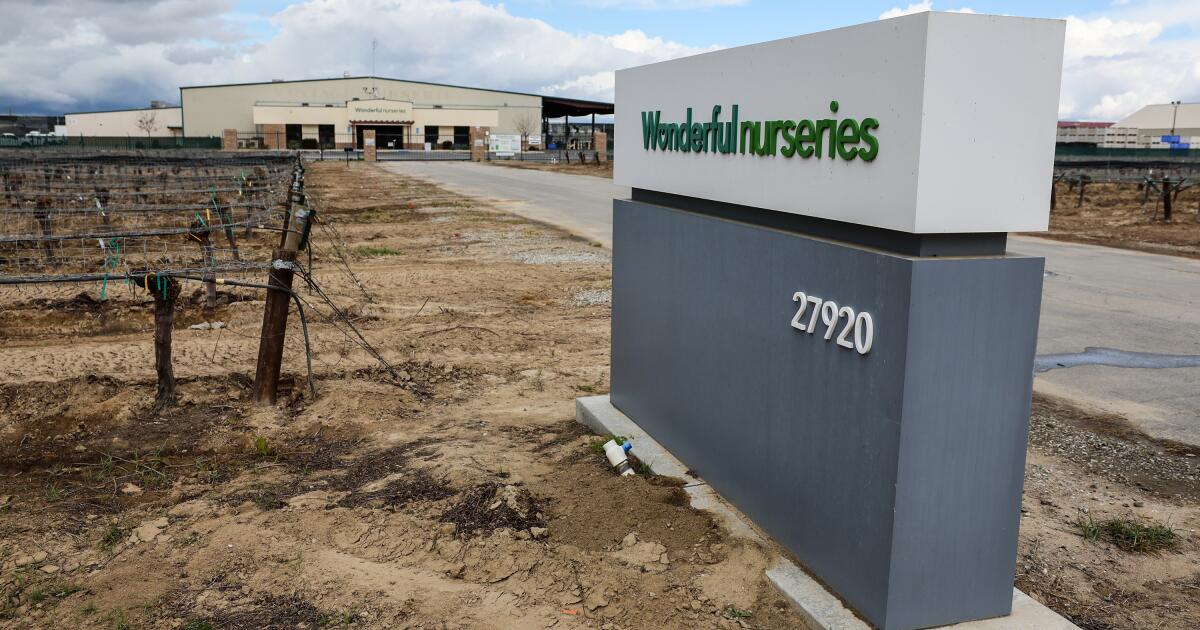
The revelation that United Farm Workers would be representing workers at a Kern County company owned by the state’s wealthiest farming family should have been a triumphant moment for the storied union co-founded by Cesar Chavez and Dolores Huerta.
Following decades of diminishing membership in the vast stretches of California’s farm fields, the UFW had seized on a new way to unionize workers, made possible by recent state legislation. Rather than hold a formal election at a company job site, union leaders had invited employees at Wonderful Nurseries, the nation’s largest grapevine nursery, to off-site meetings where they were instructed in how to apply for $600 in federal relief for farmworkers who labored during the pandemic, as well as encouraged to sign cards authorizing the UFW to represent them at Wonderful.
Labor experts say the outcome of the UFW-Wonderful skirmish could have outsize ramifications on the future of unionizing farmworkers in California.
(Max Whittaker / For the Times)
The UFW subsequently filed a petition with the Agricultural Labor Relations Board, asserting that a majority of the 600-plus farmworkers at Wonderful Nurseries in Wasco had signed the authorization cards and asking that the UFW be certified as their union representative. It appeared to mark the UFW’s third victorious unionization drive in a matter of months.
But within days, Wonderful — part of the farming empire owned by billionaires Stewart and Lynda Resnick — hit back with an explosive allegation: The company accused the UFW of using the $600 in federal relief as bait to trick farmworkers into signing the authorization cards. And it submitted nearly 150 signed declarations from nursery workers saying they had not understood that by signing the cards they were voting to unionize.

Stewart and Lynda Resnick in a 2016 portrait
(Ryan Miller / Getty Images)
Claudia Chavez, a full-time employee of a labor contractor for Wonderful Nurseries, is among several workers who told The Times that they attended meetings where they understood that the UFW would help them claim the $600. She said she was given a card to sign, but didn’t know that signing it was a vote for the union.
“They said clearly — this I do remember — that it was $600 of aid for farmworkers who worked during COVID,” Chavez, 43, said during an interview outside her Wasco home. “But they never said, ‘If you sign, we’re going to come to your work.’”
Union leaders have stood their ground, alleging that the company intimidated workers into making false statements and brought in a labor consultant with a reputation as a union buster to manipulate worker emotions in the weeks that followed.
Antonio De Loera-Brust, UFW’s communications director, called the allegations that workers were tricked into signing union cards “categorically false.” The union has put forward other workers who said they understood what they were signing and believe that UFW representation would improve their pay and working conditions.
Still, what could have been a David-versus-Goliath tale has become something tangled and far more troubling. The UFW and Wonderful are locked in battle, each employing legal muscle and PR prowess, and will present their cases to the ALRB, the state agency charged with overseeing farm labor disputes and union elections.
Labor experts say the outcome could have outsize ramifications for the future of unionizing farmworkers in California. Though still an influential voice in Democratic leadership circles, UFW has seen its on-the-ground presence and sway plummet from its vibrant heyday in the 1960s and ‘70s. At its peak, UFW had about 80,000 members across hundreds of farms. Today, that number has fallen to about 5,000, with another 2,000 in the Teamsters or United Food and Commercial Workers International unions.
If Wonderful is found to have engaged in unfair labor practices, it could be subject to financial penalties. But if the union is found to have misled workers, it faces a blow to its credibility and its nascent resurgence could be stopped in its tracks.
“One way or another it’s going to have an impact on the ability of farmworkers to organize,” said Gaspar Rivera-Salgado, project director at the UCLA Center for Labor Research and Education. “If the union fails and it’s a setback to the organizing, it’s going to be a long while before they can find a foothold to fight for farmworkers in California.”
The UFW-Wonderful skirmish is in some ways an outgrowth of a longer-running clash between labor leaders and California’s powerful agricultural interests over the UFW’s efforts to streamline the unionization process.
For years, UFW leaders had argued that the process for unionizing work sites was stacked against them. Before the new system went into effect, farmworkers voted for union representation by secret ballot at a dedicated polling event, typically held on company grounds. The UFW contends that left workers vulnerable to employer intimidation.
In 2022, Assembly Bill 2183 sought to allow farmworkers to select labor representation through mail-in ballots or a system known as card check, which allows workers to authorize a union by signing cards off-site rather than voting in-person at a designated polling place.
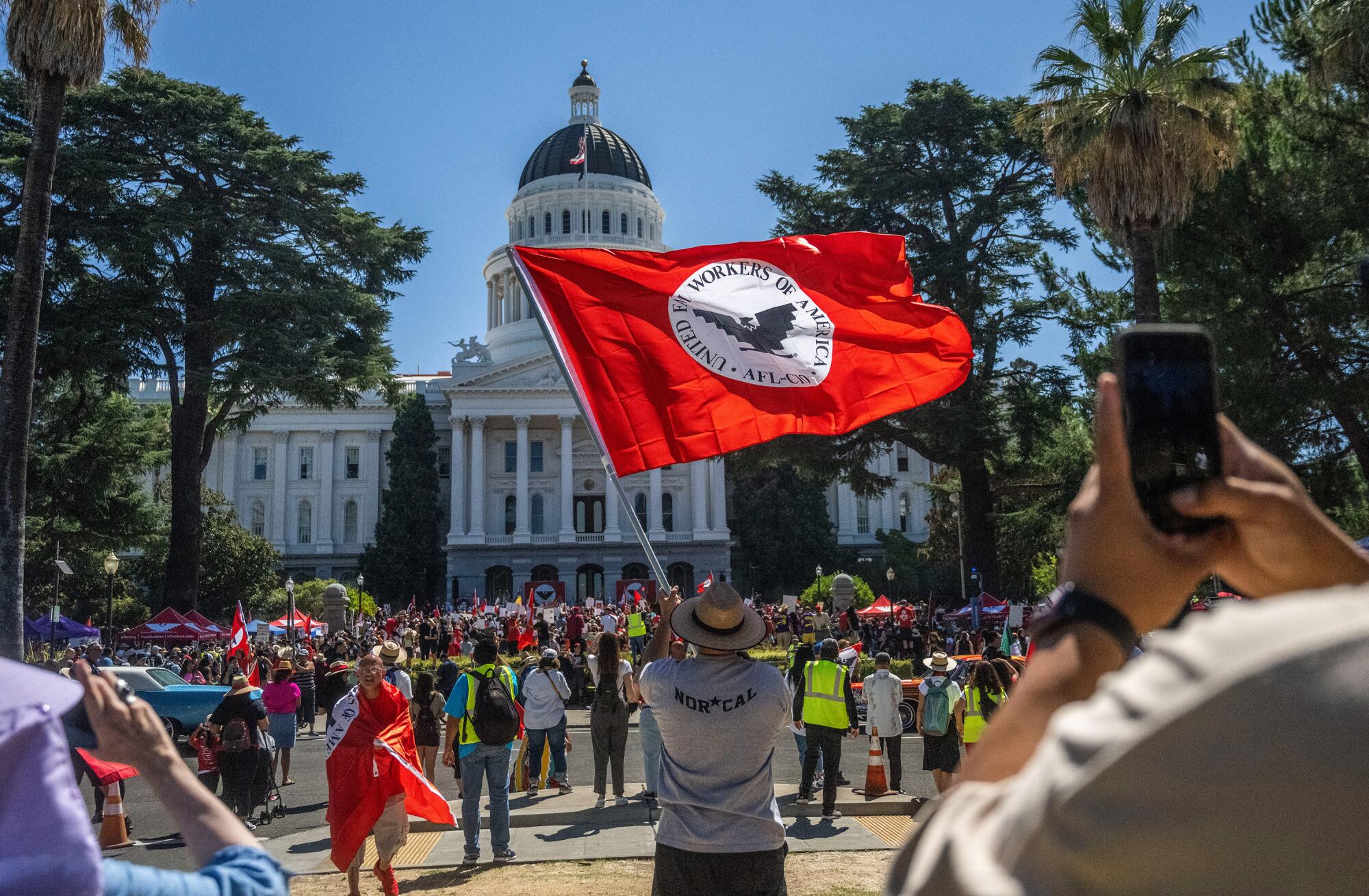
The UFW organized a 335-mile march to ramp up pressure on Gov. Gavin Newsom to sign legislation that would provide more avenues to authorize union representation at agricultural work sites.
(Hector Amezcua / The Sacramento Bee)
Gov. Gavin Newsom had vetoed a similar bill the previous year, citing concerns specific to the integrity of the mail-in balloting. His team signaled he would also veto AB 2183. But President Biden publicly exhorted Newsom to sign the bill, and the UFW organized a 335-mile march from Delano to Sacramento to ramp up pressure.
Newsom signed the bill, under the condition that it be amended to limit certain aspects. In 2023, the law was amended to remove the mail-in ballot option and cap the number of work sites that could be petitioned through card check to 75. It took effect Jan. 1, 2023, and will sunset in 2028.
Under the new system, a union can seek to organize an agricultural work site without notifying an employer. Once union representatives gather enough authorization cards to constitute what they believe is majority support, the union files a petition with the state labor board and the employer. The ALRB must decide whether there is proof a majority of the bargaining unit employees support forming a union.
But as is playing out in the Wonderful case, that process can be appealed.
From the start, the new system has been shadowed by a lack of specifics on the responsibilities of the union and employers in the card check drive. It has taken the ALRB 10 months to publish proposed regulations for the new law, and growers say they feel they’ve been playing a game with no rules.
UFW’s first certification petition under card check landed in Stanislaus County in September when it sought to represent 250 workers at DMB Packing Corp., also known as DiMare, where it won 51% support. DiMare submitted several objections, including an allegation that the union obtained signatures through “fraud” and “coercion.” The ALRB found the allegations lacked evidence.
Guadalupe Luna, 55, said working conditions at the tomato packing company in Newman were miserable — that they had no health benefits, no paid time off and got paid 77 cents for every bucket of tomatoes collected. Before Luna arrived at the farm about a year ago, he said, he worked on a farm in Firebaugh where the UFW represented workers and they received benefits and better pay.
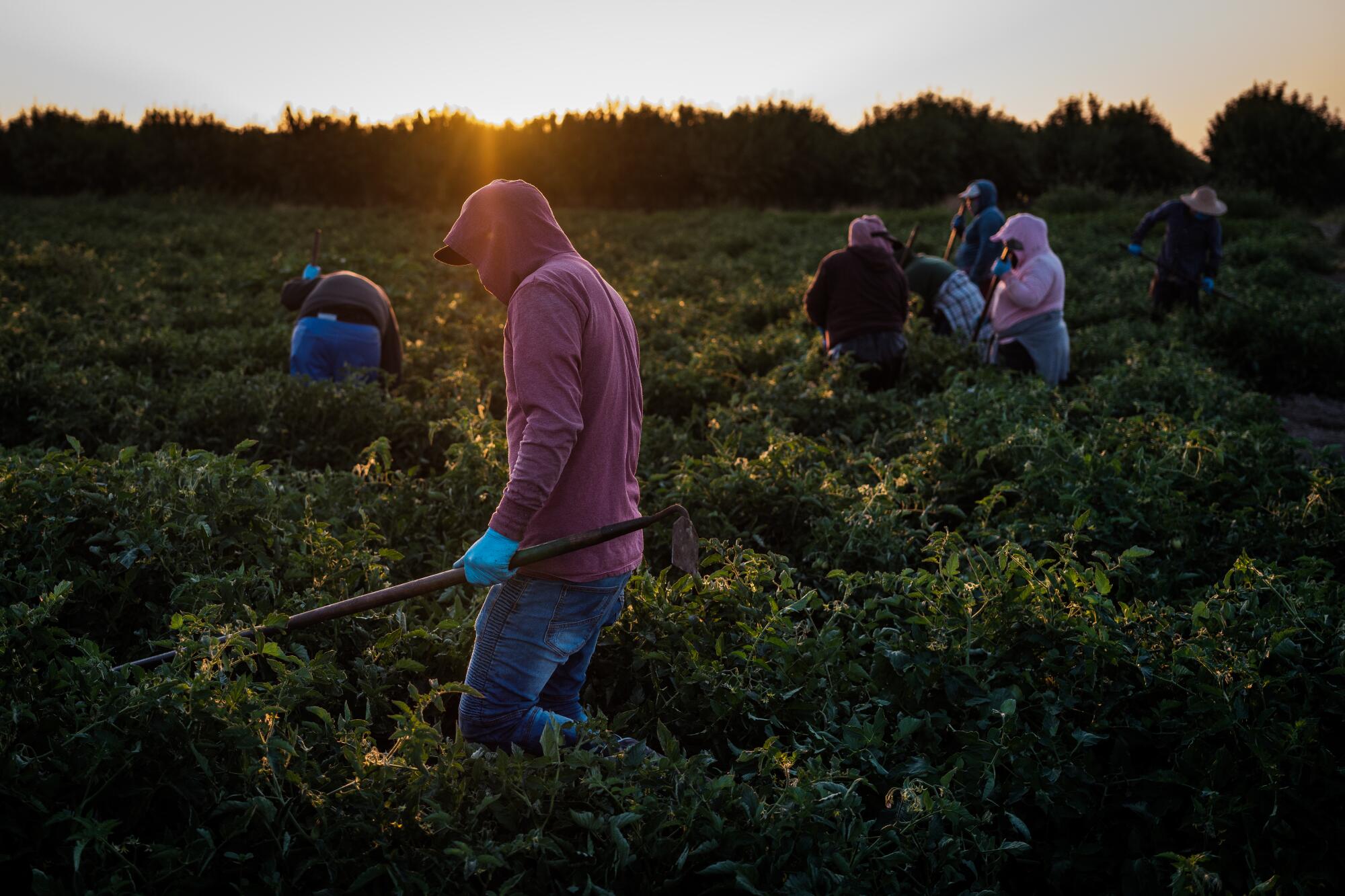
Though still an influential voice in Democratic leadership circles, the UFW has seen its on-the-ground presence plummet from its vibrant heyday in the 1960s and ‘70s.
(Max Whittaker / For the Times)
Luna, who is on the bargaining committee for the union, said the UFW meetings he attended with co-workers were focused on the benefits of unionizing and did not include conversations about the $600 federal relief payments. “The coworkers I spoke with, we talked and there wasn’t that [confusion].” he said. “We just talked to them and explained the process.”
DMB Packing President Jeff Dolan said the company is appealing the labor board’s decision. Nonetheless, he said, negotiations with the UFW and workers have been “cordial and positive.”
In Fallbrook, 50 miles north of San Diego, the UFW submitted a petition in January to represent more than 70 employees at Olive Hill Greenhouses. According to the ALRB, no objections were filed, and both sides are at the table to negotiate their first contract.
Santiago Hernandez was among those eager to unionize workers at the Fallbrook nursery. He said he told colleagues to talk to a UFW organizer and explain what they wanted out of their jobs and decide if they wanted to support a union.
The first meeting, he said, was about starting a union and they received the authorization cards to consider. He said the last meeting he attended, where people could drop off the cards, also allowed people to sign up for the $600 in relief. He did not hear from colleagues about being tricked, he said, and felt it had been clearly communicated that the two were not linked.
“The union is here to help farmworkers, not to screw with farmworkers,” Hernandez said.
One of the largest employers in the Central Valley, the Wonderful Co. prides itself on its treatment of farmworkers, including paying above minimum wage and extending company benefits — like free use of its health centers and gyms — to full-time employees. Wonderful has also invested millions of dollars in farmworker communities in Kern County, building parks and schools and improving infrastructure.
The Resnicks, owners of FIJI Water, Wonderful Pistachios and POM Wonderful, are major political donors who have contributed more than $220,000 to Newsom’s campaigns alone.
The workers at Wonderful Nurseries’ sprawling complex in Wasco tend to wine and table grapevines and nut tree rootstocks. In both the company and union narratives about the card check episode, the workers have been portrayed as pawns in a much larger game. The divergent narratives offer little room for a middle ground, for example whether there could have been some confusion in the meetings because of a general lack of understanding of the UFW’s role.
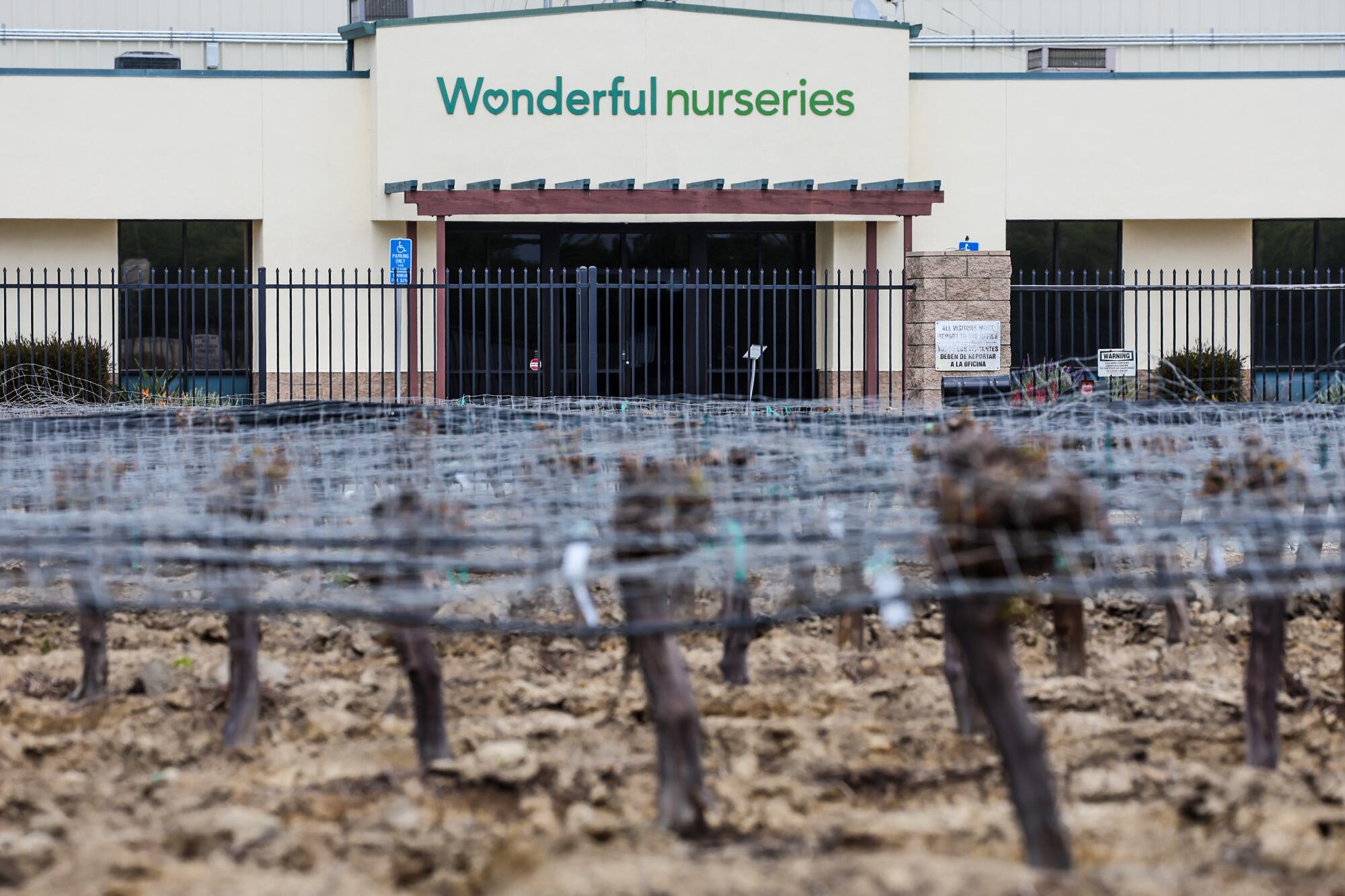
One of the largest employers in the Central Valley, the Wonderful Co. has invested millions of dollars in farmworker communities in Kern County.
(Robert Gauthier / Los Angeles Times)
There does seem to be general agreement that the organizing meetings for Wonderful employees incorporated discussion of both the federal relief payments and the unionization drive. The U.S. Department of Agriculture has authorized several organizations to distribute the one-time grants, including the UFW Foundation, which is separate from the labor union.
Rosa Maria Silva de Rodriguez, 40, who has worked at Wonderful Nurseries for five years, said she hosted several of the meetings at her home last year. She said she wants a union because she feels workers are being mistreated. The water provided in 5-gallon coolers was inconsistently refilled and cleaned, she said. She said she’s had uncomfortable situations in which male coworkers made suggestive comments about women and she knew of no avenue for reporting it.
Silva de Rodriguez said it was clear at the meetings that the federal relief money was not tied to signing a union card. The UFW representative “always talked about the rights of workers, what it meant to form a union, to bring in a union, what the union would do,” Silva de Rodriguez said.
Yet other workers interviewed by The Times spoke in equally heartfelt terms about feeling duped.
Maria Pedro, 27, makes $16.30 an hour as a seasonal worker for a labor contractor at Wonderful Nurseries. She likes that the work in the greenhouses is indoors — and therefore dependable, even when it rains.
“Look, I just got home, and I’m clean,” Pedro said on a recent afternoon, as she sat at a table in her work clothes, khaki-colored pants and a black, long-sleeved shirt.

The workers at Wonderful Nurseries’ sprawling complex in Wasco tend to wine and table grapevines and nut tree rootstocks.
(Robert Gauthier / Los Angeles Times)
She described attending a meeting last year at a colleague’s home in Wasco. She said a UFW representative was there to help Pedro and others apply for the $600 federal grant. As a single mother of three, the money would help her pay rent and buy diapers.
Pedro, who emigrated from Guatemala five years ago, said she had never heard of the union. But during the meeting, the rep explained that the organization helps farmworkers assert their rights. Pedro signed several documents. Among them was a white card emblazoned with the union’s eagle logo that reads, in English and Spanish, “I authorize the Union of Farm Workers of America to be my union representative to collectively negotiate an employment contract with my employer to improve my wages, working conditions and benefits.”
The union rep never asked if the workers wanted to join the union and didn’t explain the significance of the cards, Pedro said.
On Feb. 23, the UFW filed a petition with the ALRB to represent Wonderful Nurseries employees. Several workers, including people for and against unionizing, described attending meetings days later, led by an outside consultant, Raul Calvo, who has built a business advising farm companies on how to avoid unionization. The workers said Calvo told them about the union’s entrance into Wonderful Nurseries and that once the contract was ratified, 3% of their paycheck would go toward union dues.
Pedro said it was only then that she realized that, by signing the card, she had voted for the UFW to represent her. “Thanks to him, we understood what was happening, because the union never really explained what they did,” she said.
If her name was on the petition, Pedro said, she wanted it removed and asked Wonderful for help. She was among the workers who signed a declaration.
Silva de Rodriguez, on the other hand, contends Calvo was the first to suggest employees were tricked. She said workers began admitting to supervisors that they had signed the union card and faced pressure to renounce their support. She said she has seen workers who once supported the unionization effort now protest against it.
“It bothers me, but at the same time, it gives me a bit more strength, because I am fighting for something fair, something fair for everyone,” she said.
The union filed a charge against Wonderful Nurseries, alleging the company required workers to attend a “captive audience” meeting to urge employees to reject UFW representation. Wonderful Nurseries maintains it “provided interested employees with factual information about the process and their rights.”
Calvo confirmed to The Times he is working for the company but declined to answer questions about his role.
The ALRB acknowledged receiving worker declarations on March 1 and called the allegations “serious in nature.” Three days later, the regional director of the labor board moved forward to certify the union’s petition, determining the UFW had submitted 327 valid authorization cards from a bargaining unit of 640, establishing majority support.
The dispute crystallized last week when about 100 Wonderful Nurseries workers left work and traveled 60 miles north to the labor board’s Visalia office. They sported the orange safety vests they’re required to wear at work and carried signs reading, “We don’t want a union! Listen to our voices. Don’t ignore us.”
While the company and two participants who spoke with The Times were adamant the demonstration was worker-led, the UFW has filed a charge with the board alleging that Wonderful Nurseries coerced workers into attending.
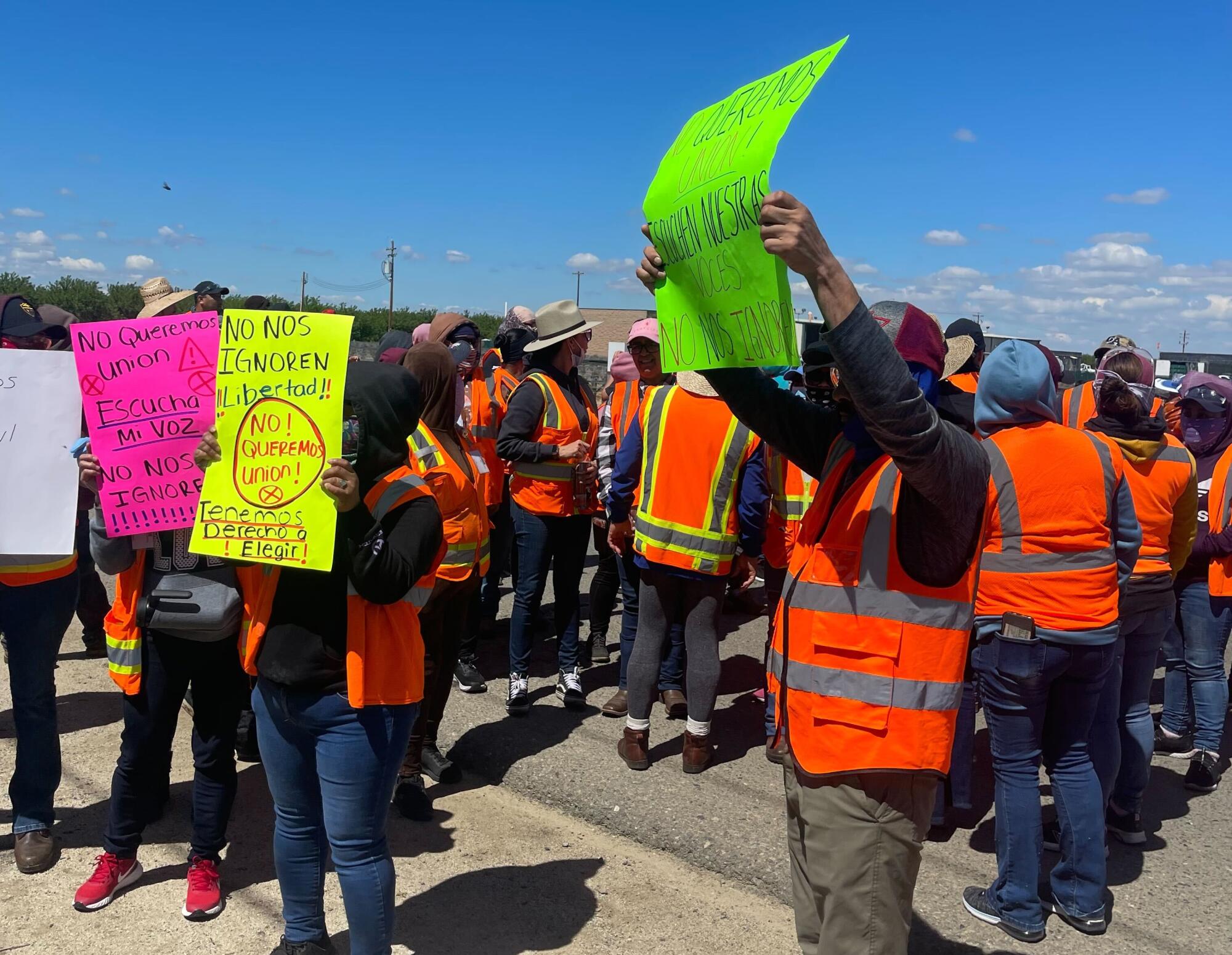
About 100 employees of Wonderful Nurseries who say the UFW used deceptive tactics in its unionization drive stage a protest at the Agricultural Labor Relations Board in Visalia.
(Courtesy of Claudia Chavez)
Last week, in yet another escalation, a Central Valley law firm that frequently represents the UFW filed charges with the state Civil Rights Department on behalf of seven workers, including Silva de Rodriguez, alleging that Wonderful Nurseries doesn’t provide sexual harassment training, resulting in a “hostile work environment.”
Wonderful fired back, dismissing the charges as “bogus claims.” In a statement, company President Rob Yraceburu said every manager, including those employed through third parties, is in compliance with all mandatory training, and that the company provided the UFW with its employee handbook, which includes its harassment policy, a week before the charges were filed.
“It’s getting harder to keep up with the fire hose of lies the UFW is pushing in their effort to divert attention from their fraudulent conduct in a vote decided by just seven votes, but where more than 150 farmworkers say they were misled,” Yraceburu said.
Wonderful has appealed the UFW certification. The state labor board is expected to meet this month to consider the company’s objections.
This article is part of The Times’ equity reporting initiative, funded by the James Irvine Foundation, exploring the challenges facing low-income workers and the efforts being made to address California’s economic divide.

Business
TV series based on Shohei Ohtani interpreter gambling scandal in the works at Lionsgate

Lionsgate Television is developing a scripted series based on the real-life gambling scandal involving Dodgers superstar Shohei Ohtani’s interpreter.
The show will follow Ohtani’s story — his meteoric rise in the MLB, his 10-year, $700-million contract with the Dodgers and then the devastating news that his interpreter, Ippei Mizuhara, had allegedly stolen $17 million from him to pay off gambling debts.
The Dodgers fired Mizuhara after learning of the allegations. Mizuhara, 39, has agreed to plead guilty to one count each of bank fraud and signing a false tax return. He faces up to 33 years in prison for the two crimes.
The series will be produced by Tony Award winner Scott Delman, known for “The Book of Mormon” and “Raisin in the Sun,” and sports journalist Albert Chen, Santa Monica-based Lionsgate said Thursday.
“This is Major League Baseball’s biggest sports gambling scandal since Pete Rose — and at its center is its biggest star, one that MLB has hitched its wagon on,” Chen said in a statement. “We’ll get to the heart of the story — a story of trust, betrayal and the trappings of wealth and fame.”
The Ohtani series is just the latest in a long list of TV shows and movies that have been ripped from the headlines. The 2018 rescue of a soccer team from a cave in Thailand was the subject of two movies, a Netflix series and documentary and a National Geographic documentary. Last year’s “Dumb Money” was based on the real-life Gamestop stock saga, one of several Hollywood projects that were launched to capitalize on the meme stock sensation.
Business
L.A. County to offer discounted home internet to lower-income residents in some neighborhoods

With the federal government poised to slash subsidies for internet service, L.A. County has started work on a wireless broadband network that will deliver high-speed connections for as little as $25 a month.
The county announced this week that it had signed a contract with WeLink of Lehi, Utah, to build the network and offer the service in East Los Angeles, Boyle Heights and South Los Angeles. Qualified households will be offered a $40-per-month discount on WeLink’s rates, meaning they could obtain the basic 500-megabits-per-second service for $25 a month.
The contract brings a new internet provider to neighborhoods now served mainly by Spectrum and AT&T, which also offer discounted service for lower-income residents — though at much lower speeds. But it will take months for WeLink to build its network, which will rely on a series of rooftop antennas connected to the internet through existing fiber-optic lines.
The looming loss of federal subsidies is a much more immediate problem. Unless Congress renews its funding, the Affordable Connectivity Program will be lapsing this month, terminating a $30-per-month benefit that has allowed 23 million lower-income households to obtain broadband service at little or no cost.
L.A. County has more of these subsidy recipients than any other county in the country — 983,000 households, said Eric Sasaki, manager of major programs for the county’s Internal Services Department. The county’s enrollment, he said, is higher than that in 45 states.
The county’s deal with WeLink has similar roots to the Affordable Connectivity Program, which grew out of the emergency broadband subsidy program the federal government launched at the height of the COVID-19 pandemic.
In 2021, Sasaki said, the L.A. County Board of Supervisors decided to explore ways to bring high-speed internet quickly to lower-income neighborhoods where more than 20% of the homes weren’t connected. Concerned about kids struggling to attend online classes, the county looked at putting wireless internet hubs at libraries, parks and even restaurant chains before deciding to conduct demonstration projects in four regions: East L.A./Boyle Heights, South L.A., the northern part of the San Fernando Valley, and five cities in the southeastern part of the county.
The county has received $50 million in federal funds for the projects, but about $45 million will go to the East L.A. and South L.A. rollouts, Sasaki said.
“We are also looking for additional funding sources to help execute additional projects,” he said.
The demonstration projects “are kind of a proof of what is possible,” Sasaki said. “The idea was that these would be sustainable and long term.”
WeLink’s service area in East L.A. and South L.A. covers more than 275,000 households and small businesses within 68 square miles.
All or part of the following communities are to be served:
East Los Angeles, Boyle Heights, Lincoln Heights, Montecito Heights, El Sereno, Adams-Normandie, University Park, Historic South-Central, Exposition Park, Vermont Square, South Park, Central-Alameda, Chesterfield Square, Harvard Park, Vermont-Slauson, Florence, Florence-Firestone, Manchester Square, Vermont Knolls, Gramercy Park, Westmont, Vermont Vista, Broadway-Manchester, Green Meadows, Watts, Athens, Willowbrook, West Rancho Dominguez and Walnut Park.
The company plans four tiers of service, with equal speeds for uploads and downloads: $65 a month for 500 Mbps, $75 for 1 gigabyte per second, $85 for 2 Gbps, and $99 for small-business connections. Installation and a router will be included, WeLink Chief Executive Luke Langford said.
Qualified homes will receive a $40-a-month discount on the residential tiers. The initial plan is to use the same eligibility requirement the federal government uses for the Affordable Connectivity Program: households earning up to 200% of the federal poverty level, which would be $30,120 for a single individual or $62,400 for a family of four. If the federal program is extended, qualified households would be able to receive the WeLink service at no cost.
If the program is not extended, WeLink and the county will come up with an alternative metric, Langford said, adding that his company is comfortable offering the discounts under the current terms.
The contract calls for WeLink to provide discounted service to 50,000 households. Sasaki said the county would be thrilled if that many homes signed up for the $25 monthly service; if there is even more demand, he said, the county will look for ways to support it.
Surveys show that lower-income households are less likely to have a home internet connection not because the service isn’t available, but mainly because it’s not affordable. Other problems include not having a computer or knowing how to use one, as well as a lack of awareness about programs that can help users overcome these hurdles.
Sasaki said the county plans to address those issues with programs to supply free laptops and technical assistance from “digital navigators” in the communities being served.
It wasn’t an explicit goal of the community broadband program to spark more competition among internet providers, but that’s happening with the WeLink deployment. And if Spectrum and AT&T lower their prices in response, Sasaki and Langford said, that’s another way the project will benefit targeted communities.
WeLink uses unlicensed spectrum in the 60-gigahertz band of frequencies, which means it doesn’t need to obtain permits for the airwaves or tear up streets for new fiber-optic lines. It will also design the network in a way that reduces the number of antennas required to carry data.
Those steps should speed construction of the network, Langford said. But WeLink still has to strike deals to mount its antennas on rooftops, lights and street poles, he said, as well as to use the fiber-optic lines that will connect its network to the internet.
Langford said he expects a “relatively modest” number of customers to be offered service by the end of the year, with the bulk of the deployment going live in 2025 and beyond. People interested in the service can sign up for updates at the WeLink website.
The very high frequencies used by WeLink can transmit an enormous amount of data, but unlike the lower frequencies used by radio stations and cellphones, they don’t travel well through walls. Langford said WeLink installers will either use new cables or a building’s existing wiring to connect the rooftop antennas to routers inside customers’ homes and businesses.
Founded in 2018, WeLink has built networks serving parts of Las Vegas, Phoenix, Dallas, Washington, D.C., and Los Angeles, Langford said.
Business
LAist staffers offered buyouts ahead of possible layoffs at public radio station
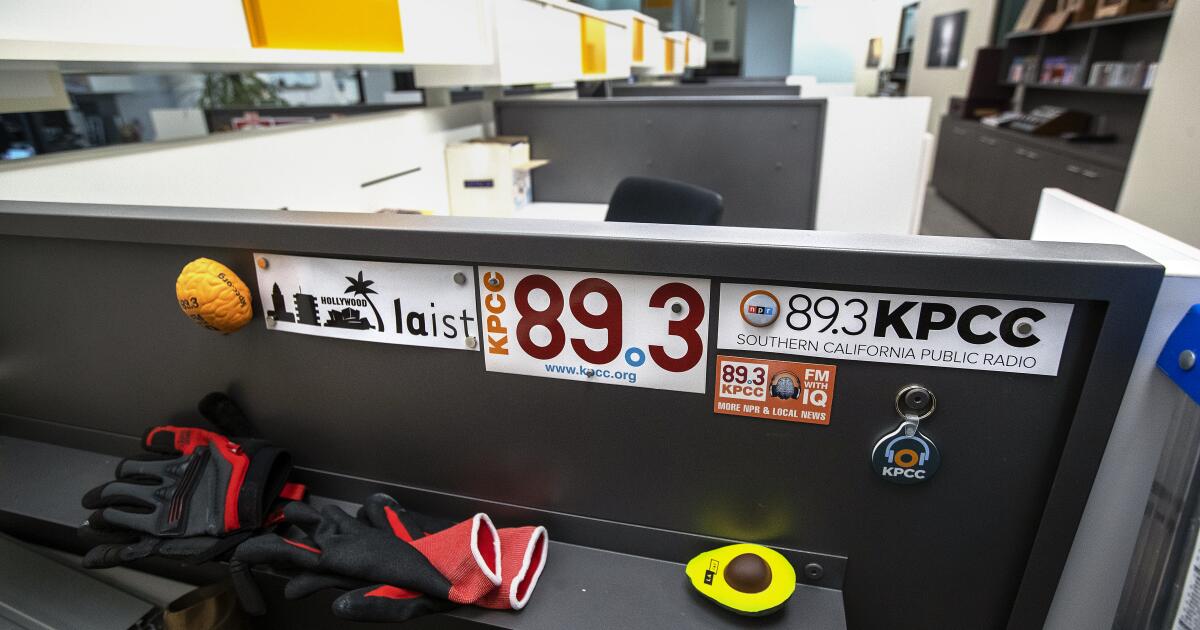
Journalists at LAist have been offered buyouts ahead of a potential round of layoffs at the local public radio station that broadcasts under the call sign KPCC-FM (89.3).
Kristen Muller, chief content officer at LAist, informed donors by email on Thursday that the company is pursuing a “voluntary buyout program for current employees” in an effort to prevent cuts. All full- and part-time staffers who work at least 24 hours per week are eligible for buyouts.
LAist reporter Caitlin Hernández posted an excerpt from the memo online, along with a link for listeners who wish to donate to the nonprofit parent network Southern California Public Radio.
“Our hope is that these buyouts will be enough to shrink the gap and avoid layoffs, but that remains unclear,” Muller wrote. “In a commitment to transparency, we will continue to share updates with you as the situation evolves.”
In a statement provided Thursday to The Times, Muller said LAist is “facing a significant budget shortfall” ranging from $4 million to $5 million over the next two years. She cited a decline in advertising, dried-up investment reserves, digital monetization issues “and overall cost increases that have not kept pace with revenue.”
“We have reduced all non-salary expenses as much as possible,” the statement read.
“This does not mean we are retreating from our cross-platform ambitions, or our desire to be a daily digital habit for Southern Californians seeking trustworthy news and information,” it continued. “In fact, our work has never been more vital, and we are committed to its growth.”
LAist is not the only SoCal media organization that has been struggling.
In March, the Long Beach Post laid off nine staffers after newsroom employees moved to unionize and went on strike to protest the impending cuts. Former and striking Long Beach Post journalists have since formed their own media outlet, the Long Beach Watchdog.
According to the Watchdog, the National Labor Relations Board is investigating allegations that the Long Beach Post and the Long Beach Business Journal retaliated against workers for moving to unionize under the Media Guild of the West. The Times has asked a Post representative for comment.
The Los Angeles Times also has undergone layoffs in recent months. The Times cut more than 100 staffers — roughly 20% of the newsroom — in March, citing heavy financial losses.
-

 Politics1 week ago
Politics1 week agoStefanik hits special counsel Jack Smith with ethics complaint, accuses him of election meddling
-

 Politics1 week ago
Politics1 week agoThe White House has a new curator. Donna Hayashi Smith is the first Asian American to hold the post
-

 World1 week ago
World1 week agoTurkish police arrest hundreds at Istanbul May Day protests
-

 Politics1 week ago
Politics1 week agoAdams, NYPD cite 'global' effort to 'radicalize young people' after 300 arrested at Columbia, CUNY
-

 News1 week ago
News1 week agoVideo: Police Arrest Columbia Protesters Occupying Hamilton Hall
-

 News1 week ago
News1 week agoSome Republicans expected to join Arizona Democrats to pass repeal of 1864 abortion ban
-

 News1 week ago
News1 week agoPolice enter UCLA anti-war encampment; Arizona repeals Civil War-era abortion ban
-

 Politics1 week ago
Politics1 week agoNewsom, state officials silent on anti-Israel protests at UCLA

/cdn.vox-cdn.com/uploads/chorus_asset/file/22173543/IMG_6828_3.jpg)











